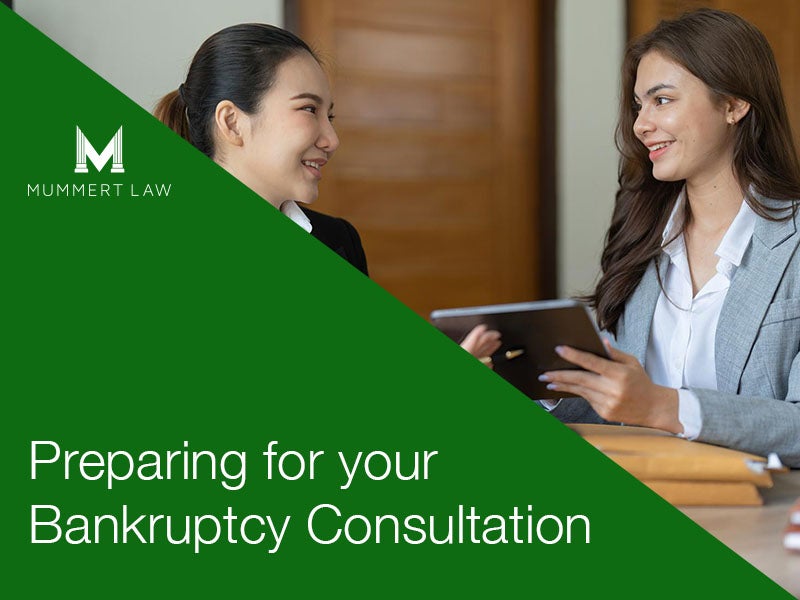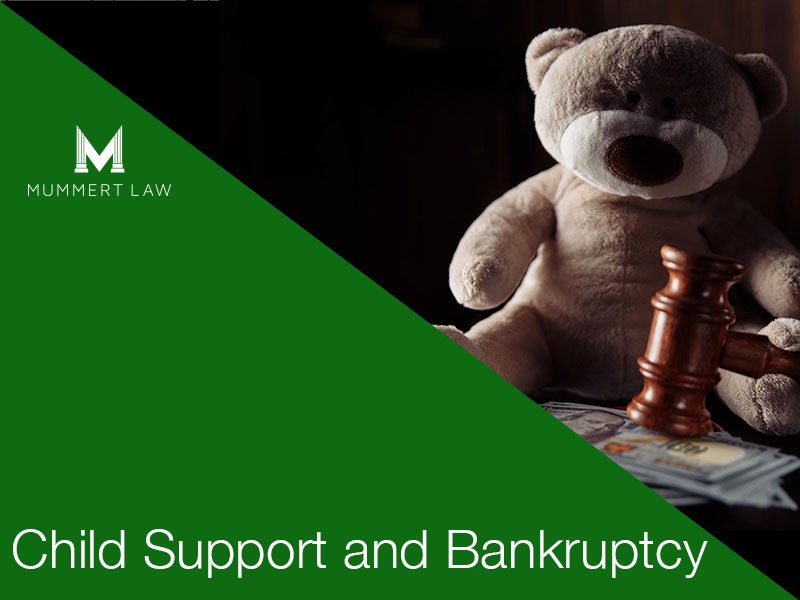-
Preparing for your Bankruptcy Consultation

During your bankruptcy consultation, you’ll meet with an attorney or paralegal to discuss your financial situation, goals, and why you think a Chapter 7 or Chapter 13 bankruptcy is the right step. Using that information, the bankruptcy attorney will determine if you’re a good candidate for bankruptcy and which type.
Here’s how to prepare for your meeting with the bankruptcy attorney.
Questions They Will Ask You
At your bankruptcy consultation, the attorney will have to ask you questions about your finances and life to know how they can best help you.
They’ll ask you what led you to consider bankruptcy, whether it’s medical bills, credit card debt, an income imbalance, or other reasons. They may also ask:
- What your marital status is
- If you have children
- What your and your spouse’s income is
- Are you separated or divorced from a spouse
- Do you have a marital or separation agreement
- Is there a Judgment of Absolute Divorce
- What your last six months of income is
- Whether you own a business or are an employee
- Approximate value of any assets you own
- If you’ve recently transferred or sold any property
- Whether you owe back taxes or are behind on alimony or child support payments
- If a creditor has sued you or has a judgment against you
- What you hope bankruptcy will achieve
Documents To Bring To Your Bankruptcy Consultation
You may receive a list of documents the attorney wants you to bring to your first bankruptcy consultation. If they don’t, this list can help you gather documents. Having your financial documents handy will make the process easier and help the attorney understand your financials to determine if you’re a bankruptcy candidate:
- Copies of your social security card and driver’s license
- Your last two years’ tax returns
- Bank statements for the previous six months
- Pay stubs for the last six months
- Current mortgage, car loan, and other debt statements
- The current estimate of your vehicle’s value (can get from NADA or Kelley Blue Book)
- Recent statements from investment and retirement accounts
- Copies of life insurance policies
- Foreclosure paperwork if your home is in foreclosure
- Copy of separation or divorce agreement, if applicable
Questions To Ask
Although the bankruptcy attorney will provide a lot of information, you’ll probably still have questions to ask them. Before the meeting, write down your questions so you’re prepared and won’t forget them.
Here are some ideas of questions to ask the bankruptcy attorney during your initial bankruptcy consultation:
- Should I file for Chapter 7 or Chapter 13 bankruptcy?
- Do you accept payments, or do I have to pay fees upfront?
- Can I keep my car and house?
- Can I keep my other property and bank accounts?
- What do your fees include?
- What do your fees not include?
- How long does it take to prepare and file my bankruptcy petition?
- Will I have to go to court for the bankruptcy hearings?
- How long does the process take?
Fees To Pay
Although your initial bankruptcy consultation is sometimes free, you must pay the attorney to take on your case. There will also be filing, court fees, plus additional costs for the credit counseling, debtor education course, credit report, and means test.
Bankruptcy law requires your attorney to provide a detail retainer outlining the initial costs and potential additional costs. Discuss the fees with the attorney and ask for a copy of the retainer agreement. Ensure you understand each fee, how much the entire process can cost, and your payment options.
Planning Your Bankruptcy Consultation with the Attorney
Preparing properly by gathering the necessary documentation and information will help make your consultation go smoothly and maximize your time with the bankruptcy attorney. Leave plenty of time to gather paperwork before your meeting, as it can be time-consuming.
How Mummert Law conducts its initial consultations
At Mummert Law, you will meet with an attorney, not a paralegal. Tim will ask a series of questions to have a basic understanding of your matter. The initial consultation can be in person or via Zoom.
Are you seeking a bankruptcy attorney in Maryland? Contact Mummert Law today to schedule your bankruptcy consultation. Tim Mummert has years of bankruptcy experience and can work with you to chart the best course of action!
-
Child Support and Bankruptcy

Child Support And Bankruptcy
Some parents paying or receiving Child Support find themselves in a financial situation that requires intervention. Bankruptcy is one way people can escape debt and face a better financial future.
Suppose you owe child support and plan to file bankruptcy, or your child’s co-parent is, it’s essential to understand how bankruptcy can affect child support. Bankruptcy will not change the mutual agreement or court-ordered child support obligations. But there are ways it can make recovering overdue child support easier and different types of relief available.
Types Of Bankruptcy
There are two types of bankruptcy for individuals: Chapter 7 and Chapter 13.
Those who meet certain income requirements can have all their unsecured debts forgiven under a Chapter 7 bankruptcy. However, the court may require selling some property or assets to repay creditors.
Those over the income requirements can still get relief through Chapter 13 bankruptcy but may have to pay back all their obligation.
Bankruptcy And Child Support Litigation Stay
How the court treats child support litigation, and bankruptcy depends on the type of bankruptcy.
Chapter 7 Bankruptcy
When filing a Chapter 7 bankruptcy, the courts put an automatic stay in place to prevent claims against you. But the stay does not stop actions from seeking past due child support or establishing child support. Proceedings in these matters can continue despite your Chapter 7 bankruptcy filing.
It’s also important to note that your income earned after filing Chapter 7 bankruptcy cannot be part of the bankruptcy estate. It can, however, determine child support obligations or pay arrearages.
Chapter 13 Bankruptcy
A Chapter 13 bankruptcy filing works differently. All earned income becomes part of the bankruptcy estate. The party seeking to impose a child support obligation can have the family court determine the amount of the child support.
Someone who is already subject to a child support order but fails to make the payments after filing Chapter 13 bankruptcy may find the court lifts the stay to allow recovery of support payments.
A Chapter 13 Plan must also address the past due child support obligations. Most of the time, all of the arrears must be paid to the Trustee and paid to the parent receiving the child support. There are exceptions. For example, if there is already an established arrearage payment, the Debtor may not be required to include the arrears in the Chapter 13 Plan if the arrears are satisfied during the bankruptcy.
How To Protect Child Support Payments From Bankruptcy Filing
Suppose you have money in the bank or cash from child support payments you received before filing for bankruptcy. In that case, it may become part of the bankruptcy estate. Maryland recognizes child support payments as exempt, meaning the bankruptcy trustee cannot use it to pay off creditors.
To ensure your child support money stays safe, it must be listed as an asset in your bankruptcy petition and properly exempted property. However, if it is comingled in a bank account with your normal earnings, it may have lost exemption. An experienced attorney will be able to trace the funds back to origination as well as other funds to be able to argue that it is still child support and should be exempt from distribution.
Child Support: A Priority Debt
Both federal and state court systems recognize the importance of providing for minor children. Whether you file for Chapter 7 or Chapter 13 bankruptcy, child support is not dischargeable in bankruptcy because it’s a priority debt. You will also be responsible for paying any overdue payments from your bankruptcy process.
As a priority debt, child support takes precedence and is one of the first obligations paid from a bankruptcy proceeding. You must pay child support in full as part of a Chapter 13 bankruptcy repayment plan before you receive a discharge from your debt obligations.
Ensuring Bankruptcy Doesn’t Affect Child Support
If you’re receiving child support or paying it, you want to ensure your child gets the care they need and the custodial parent the funds to do so. If you don’t already have a bankruptcy attorney, contact Mummert Law today to schedule a consultation to ensure bankruptcy doesn’t affect your child’s support payments.

